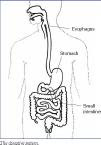Gastroparesis is a disorder in which the stomach takes too long to empty its contents. Normally, the stomach has regular contractions to move food down into the small intestine for digestion. Gastroparesis results from damage to the vagus nerve that controls this movement. When the nervous system is compromised, the muscles of the stomach and intestines don’t work normally, and food moves slowly or stops moving through the digestive tract. Symptoms include heartburn, pain in the upper abdomen, nausea, vomiting of undigested food (sometimes several hours after a meal), feeling full after only a few bites of food, weight loss due to poor absorption of nutrients or low caloric intake, abdominal bloating, unstable blood glucose levels, lack of appetite, gastroesophageal reflux, and abdominal spasms.
The most common cause of gastroparesis is diabetes. Here, high blood sugar affects the health of nerves throughout the body and can damage the vagus nerve. Other causes include surgery on the stomach, viral infections, eating disorders (anorexia nervosa or bulimia), medications that slow contractions in the intestine, and gastroesophageal reflux disease (GERD).
Sometimes no cause can be found - these cases are referred to as idiopathic gastroparesis.
I discussed your question with Gerard Mullin, M.D., associate professor of medicine and an integrative gastroenterologist at Johns Hopkins Hospital. He told me that acupuncture and electroacupuncture have been shown in randomized trials to be effective for gastroparesis, and that a study published in the European Journal of Gastroenterology & Hepatology in May, 2008, found that ginger accelerates gastric emptying. The dose used in the study was three capsules containing a total of 1,200 mg of ginger. Another natural remedy that may prove useful is Swedish bitters - an herbal concoction. The typical dose is one tablespoon before meals. Dr. Mullin also recommended visceral manipulation-massage, a type of massage that aims to release stress and tension from abdominal organs.
Try to find an osteopathic physician (D.O.); one resource is www.academyofosteopathy.org. Or find an experienced massage therapist trained in this technique. Dr. Mullin added that hypnosis and music therapy can also be helpful.
Andrew Weil, M.D.
 2:02 AM
2:02 AM
 Ken Mark
Ken Mark
























































